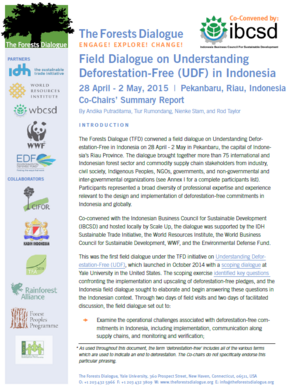Co-Chairs’ Summary: Field Dialogue on Understanding Deforestation-Free (UDF) in Indonesia
From 28 April to 2 May 2015, The Forests Dialogue held its first field dialogue on Understanding Deforestation-Free (UDF) in Riau, Indonesia. The dialogue, jointly convened with the Indonesian Business Council for Sustainable Development (IBCSD) and locally hosted by ScaleUp, brought together over 75 international and Indonesian forest sector and commodity supply chain stakeholders from industry, civil society, Indigenous Peoples, NGOs, governments, and inter-governmental organizations.
Through two days of field visits and two days of facilitated discussion, the dialogue examined the operational challenges associated with deforestation-free commitments in Indonesia and identified key challenges and solutions for policy design and implementation both in Indonesia and on a global scale. A number of agreed lessons and recommendations emerged from the dialogue. Key messages include:
- Government engagement is necessary for the lasting success of deforestation-free. If voluntary deforestation-free commitments are to be fulfilled, governments must rethink and revise laws and regulations that hinder implementation of deforestation-free policies;
- A single, high-resolution map for Indonesia is critical for clarifying land-use and enabling deforestation-free efforts. Mapping should engage all stakeholders in a participatory process;
- Recognition and enforcement of customary rights to land are fundamental to achieving deforestation-free objectives. Implementers must be ready to adapt when regulations are promulgated;
- Deforestation-free implementation will be an ongoing process, and will require greater resources and capacity from companies, governments, and communities. These entities should be prepared to carry out mediation, HCV (and HCS) assessments, as well as support processes that enable communities to give or withhold free, prior, and informed consent;
- Piecemeal, company-by-company approaches to ending deforestation are suboptimal. A jurisdictional or landscape based approach will be necessary; successful pilots are needed to show both governments and supply chain actors that such approaches work.
Participants called for action as a result of the dialogue including:
- Communicate the agreed messages from the discussion with relevant representatives of the Government of Indonesia and other key actors not present at the dialogue;
- Build a more permanent multi-stakeholder process in Indonesia to enable more effective engagement between government officials and other stakeholders on this issue;
- Set out internationally applicable principles, guidelines, and best practices including an agreed-upon definition of deforestation-free and preferred practice that can be adapted to different geographies;
- Develop an analysis of conservation finance instruments and opportunities to capitalize on opportunities for conservation finance, looking to engage local and regional banks;
- Harmonize various monitoring and validation tools used in implementing deforestation-free policies;
- Map and analyze ongoing landscape-level management initiatives to provide lessons for scaling up deforestation-free efforts;
- Identify an Indonesian entity to carry forward the dialogue outputs. IBCSD has agreed to help convene interested organizations, and IDH offered to discuss the possibility of assisting.
The Forests Dialogue is working with partners to implement the recommended actions and to continue the dialogue in Indonesia and Internationally on this important issue. See below for the full report.
To learn more about TFD’s Understanding Deforestation Free (UDF) initiative, click here. To access more information about the UDF Field Dialogue in Indonesia, click here.

